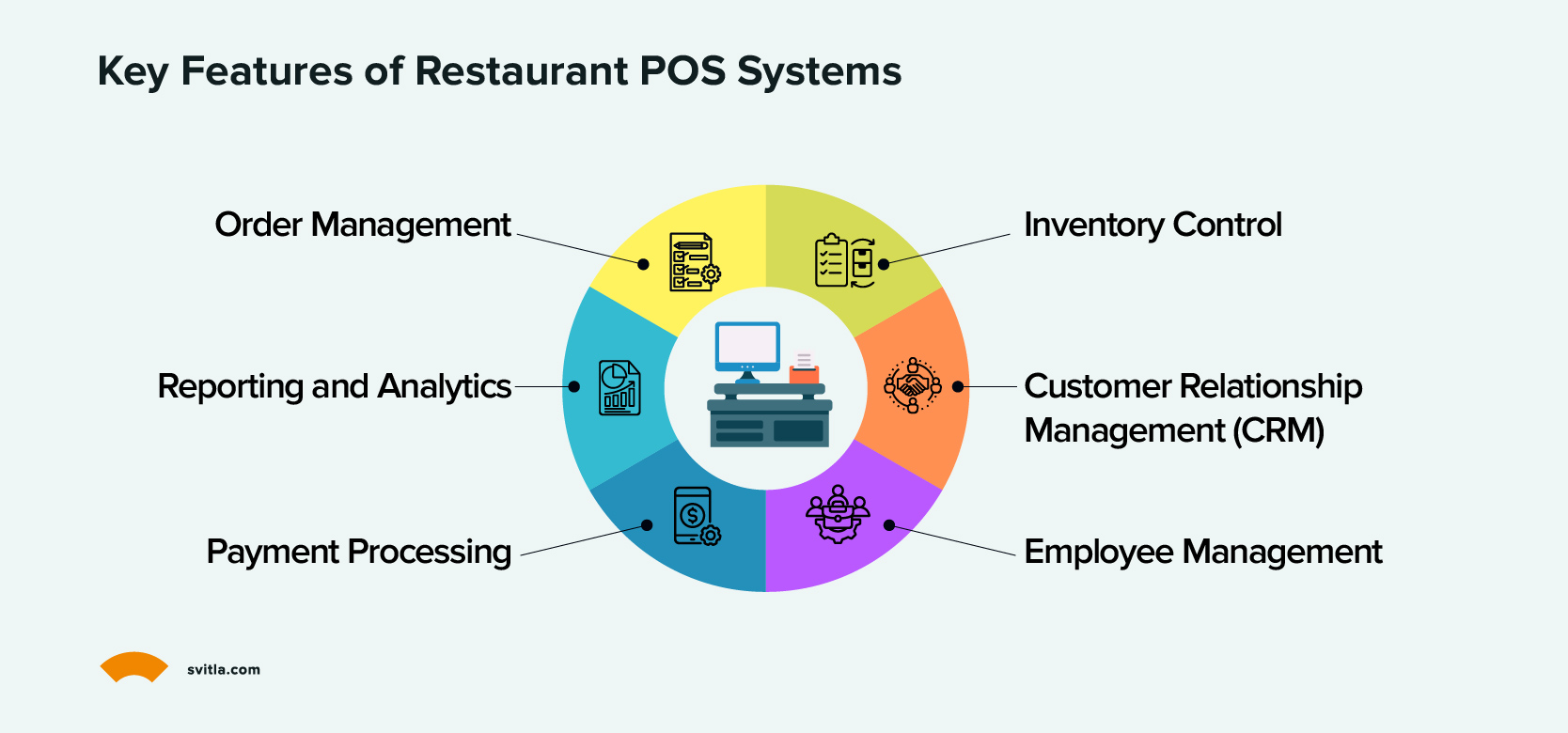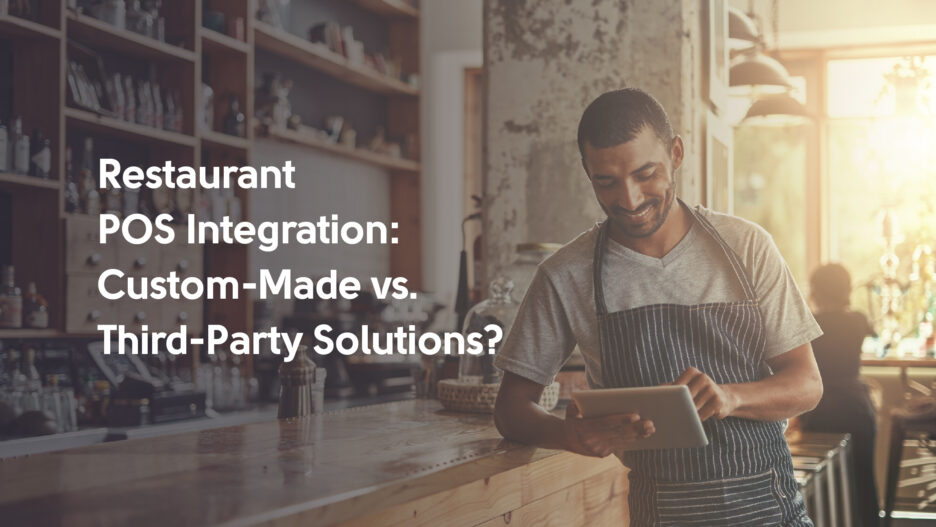Have you seen the show The Bear? The successful dramedy portrays a whirlwind restaurant environment that’s fast-paced, demanding, and relentless, where only the most efficient and adaptable survive.
While it’s a work of fiction, the similarities with the real world are striking. Restaurant management is fast-paced and as such, efficiency and adaptability are everything. Point-of-sale (POS) systems are now the backbone of smooth operations in restaurants, helping streamline everything from order-taking and table management to inventory control and customer payments. In fact, the market value of point-of-sale software is experiencing a swift expansion, increasing from $12.2 billion in 2018 to an anticipated $42.5 billion by 2027.
Truly, POS are one-stop-shops and restaurants nowadays have very little chance of running a smooth operation without one implemented into their day-to-day. For large restaurant chains, POS raises questions: should they opt for a readily available, third-party system, or invest in a custom-made solution that caters to their specific needs?
On one hand, ready-made POS solutions offer a convenient and seemingly straightforward approach. These off-the-shelf systems come pre-configured with a standard set of features and functionalities designed to cater to the general needs of the restaurant industry. They often boast user-friendly interfaces, quick installation times, and compatibility with various hardware and payment systems. For restaurant chains seeking a swift implementation and minimal upfront costs, ready-made solutions may appear attractive.
However, the one-size-fits-all nature of ready-made restaurant POS integration can also present limitations. Large restaurant chains often have unique operational requirements, customer preferences, and business processes that may not align seamlessly with the rigid structure of a generic solution. Customization options may be limited, hindering the ability to adapt to specific workflows, integrate with existing systems, or scale alongside business growth. Moreover, reliance on a third-party provider can result in dependencies, lack of control over system updates, and potential compatibility issues as the restaurant chain evolves.
On the other hand, custom-made restaurant POS integration solutions offer a tailored approach that aligns precisely with the distinct needs of a large restaurant chain. By partnering with a development team, restaurants can collaborate to create a POS system that incorporates their unique business logic, workflow requirements, and branding elements. This level of customization enables seamless integration with existing systems, such as inventory management, customer relationship management (CRM), and loyalty programs.
Custom-made solutions provide the flexibility to adapt and scale as the restaurant chain expands, ensuring that the POS system grows in tandem with the business. Additionally, having full control over the development process allows for faster issue resolution, personalized support, and the ability to implement new features and functionalities as market demands change.
In this article, we will delve into the intricacies of restaurant POS integration, comparing the features, benefits, and drawbacks of ready-made and custom-made solutions. By examining factors such as functionality, scalability, and cost, we aim to equip you with valuable insights to make informed decisions about POS system strategies.
Ready-Made POS Solutions: Convenience with a Side of Limitations
Third-party, ready-made POS systems are the workhorses of the restaurant industry, and have gained significant popularity by offering readily available and feature-rich solutions. Popular options like Toast, Lightspeed, and Revel have become household names, each boasting user-friendly interfaces and diverse features catering to a wide range of restaurant types.
These pre-configured systems are lauded for their affordability and ease of setup. They typically come equipped with the essentials for smooth operation, including:
- Order management: Take orders efficiently, manage tables, and track order status in real-time.
- Inventory control: Monitor ingredient levels, automate reordering, and prevent stockouts.
- Customer Relationship Management (CRM): Store customer information, track purchase history, and implement loyalty programs.
- Payment processing: Accept various payment methods, including credit cards, debit cards, and contactless payments.
- Reporting and analytics: Gain valuable insights into sales trends, customer behavior, and employee performance.

Now, let’s explore some leading and ready-made POS solutions.
Starting with Toast, this cloud-based system offers a user-friendly interface and a comprehensive suite of tools and features such as tableside ordering using handheld devices, inventory tracking capabilities to monitor stock levels on the fly, and real-time analytics to gain insights into sales, customer behavior, and staff performance.
Another prominent player in the ready-made restaurant POS integration market is Lightspeed. This system simplifies operations and enhances the customer experience, making it well-suited for quick-service restaurants and cafes, by boasting a sleek and intuitive interface that enables staff to navigate menus, process orders, and manage transactions efficiently. The system offers mobile ordering capabilities, integrates with popular payment processor, and places a great emphasis on speed and customer convenience.
Moving on to Revel, the system caters to a wide range of restaurant types, from quick-service to fine dining establishments. It offers features such as ingredient-level inventory management and online ordering integrations, enabling restaurants to expand their reach and cater to the growing demand for digital ordering options.
Independent restaurants, cafes, and even smaller chains often find features like the ones described perfectly adequate. The ease of use and affordability make them a compelling choice, especially for businesses that prioritize a quick and simple setup process. Additionally, some third-party POS systems offer features specifically designed for certain restaurant niches, such as table reservation systems for fine dining establishments or online ordering functionalities for quick-service restaurants.
However, the convenience of pre-made solutions can come with limitations. While these systems offer a wide range of features, they may not be a perfect fit for every restaurant chain. Here's where the cookie starts to crumble:
- Limited customization: Third-party POS systems might not integrate seamlessly with existing workflows or kitchen display systems used by larger chains because they are designed to cater to a broad audience. Additionally, specific functionalities, like loyalty programs with tiered rewards or allergen filtering for online menus, might be missing.
- Scalability concerns: As a restaurant chain grows, its needs evolve. A pre-made POS system might not be able to scale effectively to accommodate increasing transaction volumes, complex menu structures, or integrate with new technologies adopted by the chain.
- Vendor lock-in: Switching to a different POS system in the future can be a complex and costly process, especially if the initial solution becomes deeply integrated with the restaurant's operations.
There’s no hiding that third-party restaurant POS integration systems offer a compelling solution for many restaurants, particularly smaller businesses that prioritize affordability and ease of use. However, larger restaurant chains with complex operational needs and a desire for complete control over their systems might find themselves outgrowing the limitations of pre-made solutions.
Custom-Made POS Solutions: A Bespoke Experience for Peak Performance
Custom-made restaurant POS integration solutions offer a bespoke approach to restaurant management, addressing large restaurant chains' unique needs and requirements. Unlike ready-made POS software, custom-made solutions are built from the ground up, specifically designed to align with the restaurant's business processes, workflows, and goals.
Custom-made solutions give restaurants complete control over their POS system's features, functionality, and user experience. This level of customization enables restaurants to streamline their operations, integrate with existing systems, and create a seamless workflow that aligns with their unique business processes. With a custom-made solution, restaurants prioritize critical features, whether it's advanced inventory management, customer relationship management, or loyalty program integration. The flexibility to tailor the POS system to their exact requirements gives restaurants a competitive edge and allows them to optimize their operations for maximum efficiency and profitability.
Another advantage of custom-made POS solutions is the ability to scale and adapt as the restaurant grows and evolves. Large restaurant chains often have complex operations that span multiple locations, each with its own set of challenges and requirements. Custom-made solutions can be designed with scalability in mind, allowing restaurants to easily expand their POS system to accommodate new locations, menu items, or customer preferences. The modularity and flexibility of a custom-made solution enable restaurants to add or remove features as needed, ensuring that the POS system remains relevant and effective as the business landscape changes. This level of adaptability is crucial for large restaurant chains that need to stay agile and responsive in a highly competitive industry.
However, building a custom-made POS solution also comes with its own set of challenges and considerations.
- Higher upfront investment and ongoing maintenance costs: Developing a POS system from scratch requires significant investment in terms of time, resources, and expertise. Restaurants need to factor in the cost of hiring developers, designers, and project managers to oversee the development process. Additionally, the time required to build a custom-made solution can be lengthy, potentially delaying the implementation and rollout of the POS system across the restaurant chain. Unlike pre-made solutions with built-in updates and support, custom systems require ongoing maintenance to address bugs, integrate with new technologies, and ensure optimal performance.
- Defining clear objectives and integration: Clear goals and requirements such as improving order accuracy, reducing wait times, enhancing customer experience, or streamlining inventory management, should drive the design and functionality of the custom-made solution, ensuring that it aligns with the restaurant's overall business strategy. Restaurants should assess their current technology infrastructure and determine how the custom-made POS system will integrate with existing systems.
- Development time: Building a custom POS system takes time. The process can take months, from initial planning and design to development and testing, depending on the project's scope.
Next, we will compare the features and benefits of ready-made and custom-made POS solutions to help restaurants decide based on their specific circumstances.
Choosing Your Perfect Fit: A Guide to POS System Selection
Navigating the world of restaurant POS integration systems can feel like choosing the right ingredients for a complex recipe. After all, the success of your restaurant chain hinges on a solution that seamlessly integrates with your operations and fuels growth. So, how do you decide between the convenience of a pre-made third-party system and the control offered by a custom-made solution? Here's a breakdown of key factors to consider:
Budget
Ready-made solutions often have lower upfront costs, as they are mass-produced and benefit from economies of scale. Many POS providers offer subscription-based pricing models, making it easier for restaurants to manage their expenses.
On the other hand, custom-made solutions require a significant initial investment in development, design, and implementation. However, it's essential to consider the long-term costs as well.
While ready-made solutions may have lower upfront costs, they may come with recurring fees, such as monthly subscriptions or transaction fees, which can add up over time. Custom-made solutions, once developed, may have lower ongoing costs but require investments in maintenance and updates.
Business Size
The size of the restaurant business is another important factor to consider. Small to medium-sized restaurants may find ready-made POS solutions more suitable, as they often have straightforward operations and limited resources. These businesses can benefit from the pre-configured features and quick implementation of ready-made systems.
However, large restaurant chains with multiple locations and complex operations may require the flexibility and scalability offered by custom-made solutions. Custom-made POS systems can be designed to accommodate the unique needs of larger businesses, such as centralized management, multi-location inventory tracking, and advanced reporting capabilities.
Industry-Specific Needs
Different segments within the restaurant industry have distinct requirements and workflows. For example, quick-service restaurants prioritize speed and efficiency, while fine dining establishments focus on personalized service and customer experience.
Ready-made POS solutions often cater to specific industry segments, offering features tailored to their needs. Restaurants should evaluate whether the ready-made options available in the market align with their specific industry requirements. A custom-made POS system may be the better choice if a restaurant has unique or niche needs that are not adequately addressed by ready-made solutions.
Custom-made solutions can be designed to incorporate industry-specific features, integrations, and workflows that are critical to the restaurant's success.
Business Goals
The decision between a ready-made and custom-made restaurant POS integration system should also be guided by the restaurant's business goals. Consider what you want to achieve by integrating a POS system. Some common goals include:
- Streamlining operations and increasing efficiency
- Enhancing customer experience and loyalty
- Improving inventory management and reducing waste
- Gaining insights through data analytics and reporting
- Integrating with other systems, such as accounting or CRM
Evaluate whether a ready-made solution can effectively support and contribute to these goals. A custom-made solution may be more appropriate if the restaurant has specific or complex goals that require tailored functionality or deep integration with existing systems. Custom-made POS systems can be designed to align closely with the restaurant's business objectives, providing the necessary features and integrations to drive success.
Implementation and Support
The implementation process and ongoing support are critical aspects to consider when choosing a POS system. Ready-made solutions often have a faster implementation timeline, as they come pre-configured and require minimal customization. Restaurant POS integration providers typically offer installation, training, and ongoing technical support as part of their service package. This can be advantageous for restaurants that lack in-house IT expertise or resources. However, it's important to assess the quality and responsiveness of the provider's support to ensure timely assistance when needed.
On the other hand, custom-made POS systems require a more involved implementation process, as they are built from scratch. The development and deployment timeline can be longer compared to ready-made solutions. Additionally, the restaurant is responsible for supporting and maintaining the custom-made system. This requires dedicated IT resources, whether in-house or through a third-party service provider, to handle updates, troubleshoot issues, and ensure the smooth operation of the POS system. Restaurants must factor in the ongoing costs and resources required to maintain a custom-made solution.
Staff Training
The successful adoption and use of a POS system heavily rely on effective staff training. Whether a restaurant chooses a ready-made or custom-made solution, investing in comprehensive training is crucial. Staff members must be properly trained on how to use the POS system efficiently, navigate its features, and troubleshoot common issues. A user-friendly interface and intuitive workflows can facilitate faster learning and adoption.
Ready-made POS solutions often come with standardized training materials and resources provided by the vendor. This can include online tutorials, user manuals, and support channels for queries and assistance. Custom-made solutions require the restaurant to develop its training program tailored to the specific features and workflows of the system. This may involve creating training materials, conducting hands-on sessions, and providing ongoing support to staff members.
Adequate training ensures that staff can effectively leverage the POS system to streamline operations, improve order accuracy, and enhance customer service. It minimizes errors, reduces frustration, and helps staff feel confident in using the technology. Restaurants should allocate sufficient time and resources for training during the implementation phase and provide ongoing training as needed to address staff turnover and system updates.
Security and Compliance
Data security and compliance are critical considerations when selecting a POS system. Restaurants handle sensitive customer information, such as credit card details and personal data, making them a target for cyber threats. Both ready-made and custom-made POS systems must prioritize robust security measures to protect against data breaches and ensure compliance with industry regulations, such as the Payment Card Industry Data Security Standard (PCI DSS).
Ready-made POS solutions often have built-in security features and undergo regular security audits by the provider. These systems are designed to meet industry security standards and comply with regulatory requirements. POS providers typically handle data encryption, secure payment processing, and software updates to address any vulnerabilities. However, restaurants should still perform due diligence and assess the provider's security practices, certifications, and track records.
Custom-made restaurant POS integration systems require the restaurant to take responsibility for implementing and maintaining security measures. This includes ensuring secure coding practices, encrypting sensitive data, and regularly updating the system to patch any vulnerabilities. Restaurants must also ensure that their custom-made solution meets PCI DSS requirements and other relevant regulations. This may require engaging with security experts and undergoing regular security audits to validate compliance.
Regardless of the approach chosen, restaurants must prioritize data security and compliance to protect their customers' information and maintain trust. Regular security assessments, employee training on security best practices, and incident response plans should be integral parts of the POS system implementation and ongoing management.
Choosing between a ready-made and custom-made POS system requires careful consideration of multiple factors. Here's a quick cheat sheet to help you decide:
Choose a third-party POS system if:
- You have a limited budget.
- Your restaurant is small or operates within a standard niche.
- You prioritize ease of setup and ongoing support.
- Your staff is comfortable with user-friendly interfaces.
Invest in a custom POS solution if:
- You have a large restaurant chain with complex operational needs.
- You require industry-specific or highly customized functionalities.
- You prioritize complete control over your system and data security.
- You have the budget and internal resources for development and ongoing maintenance.
Ultimately, the best restaurant POS integration system is the one that perfectly aligns with your restaurant’s unique needs and propels you toward achieving your goals. Considering all of the factors in this article, you are in an informed place to choose the perfect ingredient to set your POS solution recipe up for success.





